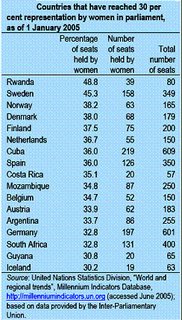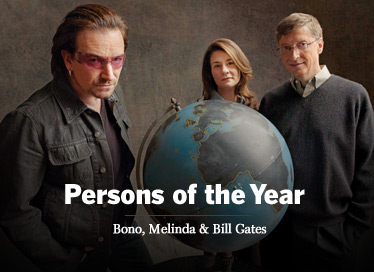42 Canadian Election Redux
So the election came and went, and with it, it seems, nearly all sense of civic engagement. It was amazing, walking from voting station to voting station (trying to figure out where i was supposed to vote in my disorganized state matching a notoriously disorganized province), seeing so many people on the street, talking about politics. And i was struck by this disproportion: perhaps the most energy expended by most people toward things political is directed toward this, possibly the least effectual thing one can do - as an individual - in the public sphere.
To return to the running theme of my election "coverage," that is, gender parity, here are the final numbers:
63 women were elected (20.45%)
Conservative: 14 out of 124 seats
Liberal : 21 out of 103 seats
Bloc: 16 out of 51 seats
NDP: 12 out of 29 seats
Remember, in 2004, it turned out that 65/308, or 21.1% of parliamentarians were women. So things are actually getting worse, not better, for women in the House of Commons?
Also, Alberta went totally to the conservatives this time around. A sea of blue, rising tides of desperation.

The only up-side: Anne McLellan, Liberal incumbent in Edmonton Centre, is finally out of the House -- you may remember McLellan as the intrepid Minister of Public Safety and Emergency Preparedness who callously defended the supposed constitutionality of security certificates.
Security certificates are issued by this ministry, at the advice of CSIS (Canadian Security Intelligence Service). These certificates, under the the Immigration and Refugee Protection Act (IRPA) allow the State to arrest permanent residents or refugees who have committed no crime, throw them in jail, and detain them indefinitely, without charging them publicly, with the aim of deporting them. Neither the accused nor their lawyers are allowed to know the content or the basis of their charge.
Amnesty International has denounced security certificates, saying that "the security certificate process falls far short of international standards for fair trials and may result in arbitrary detention and violation of the right to liberty." In a letter to Anne McLellan, Canadian legal experts argue that the certificates violate human rights, and not only the letter of Canadian law.
Now McLellan is gone, but security certificates -- and the draconian IRPA remain. It's unlikely that the Conservative party will do anything to improve the situation, given its stated platform commitment to "quickly deporting non-citizen criminals." Which is code for "arrest and deport first, ask questions later... if ever."
Another issue pushed aside by non-debates about corruption, Québec independence, and manners in the House of Commons.
To return to the running theme of my election "coverage," that is, gender parity, here are the final numbers:
63 women were elected (20.45%)
Conservative: 14 out of 124 seats
Liberal : 21 out of 103 seats
Bloc: 16 out of 51 seats
NDP: 12 out of 29 seats
Remember, in 2004, it turned out that 65/308, or 21.1% of parliamentarians were women. So things are actually getting worse, not better, for women in the House of Commons?
Also, Alberta went totally to the conservatives this time around. A sea of blue, rising tides of desperation.

Anne McLellan, former Minister of Public Safety and Emergency Preparedness
The only up-side: Anne McLellan, Liberal incumbent in Edmonton Centre, is finally out of the House -- you may remember McLellan as the intrepid Minister of Public Safety and Emergency Preparedness who callously defended the supposed constitutionality of security certificates.
Security certificates are issued by this ministry, at the advice of CSIS (Canadian Security Intelligence Service). These certificates, under the the Immigration and Refugee Protection Act (IRPA) allow the State to arrest permanent residents or refugees who have committed no crime, throw them in jail, and detain them indefinitely, without charging them publicly, with the aim of deporting them. Neither the accused nor their lawyers are allowed to know the content or the basis of their charge.
Amnesty International has denounced security certificates, saying that "the security certificate process falls far short of international standards for fair trials and may result in arbitrary detention and violation of the right to liberty." In a letter to Anne McLellan, Canadian legal experts argue that the certificates violate human rights, and not only the letter of Canadian law.
Now McLellan is gone, but security certificates -- and the draconian IRPA remain. It's unlikely that the Conservative party will do anything to improve the situation, given its stated platform commitment to "quickly deporting non-citizen criminals." Which is code for "arrest and deport first, ask questions later... if ever."
Another issue pushed aside by non-debates about corruption, Québec independence, and manners in the House of Commons.





